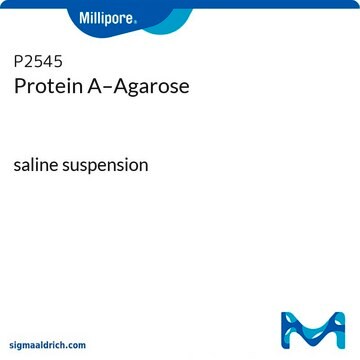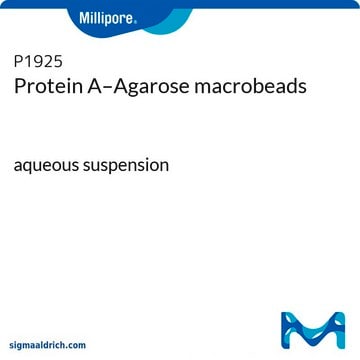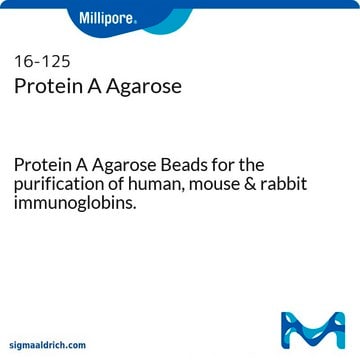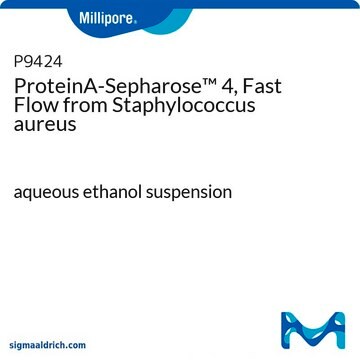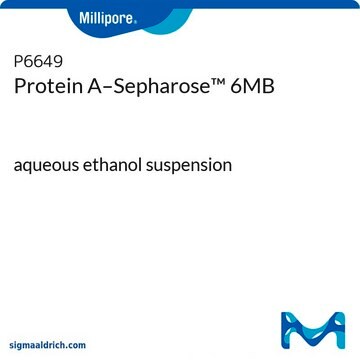Recommended Products
form
lyophilized powder
extent of labeling
~2 mg per mL
matrix
4% beaded agarose
matrix activation
cyanogen bromide
matrix attachment
amino
matrix spacer
1 atom
capacity
≥10 mg/mL binding capacity (human IgG)
storage temp.
−20°C
Looking for similar products? Visit Product Comparison Guide
General description
This Protein A-Agarose product is a conjugate of Protein A to CNBr-activated agarose without an intermediate spacer arm.
Application
Protein A-agarose is used for affinity chromatography, antibody purification and characterization, and protein A, G and L resins. Protein A-agarose has been used to study the effects of protein A immunoadsorption in patients with chronic dilated cardiomyopathy as well as to study multiple sclerosis and gastric cancer.
Quantity
Swelling: 1 g swells to approx. 4 ml
Physical form
Supplied as lyophilized powder stabilized with lactose.
Storage Class Code
11 - Combustible Solids
WGK
WGK 3
Flash Point(F)
Not applicable
Flash Point(C)
Not applicable
Personal Protective Equipment
dust mask type N95 (US), Eyeshields, Gloves
Certificates of Analysis (COA)
Search for Certificates of Analysis (COA) by entering the products Lot/Batch Number. Lot and Batch Numbers can be found on a product’s label following the words ‘Lot’ or ‘Batch’.
Already Own This Product?
Find documentation for the products that you have recently purchased in the Document Library.
Customers Also Viewed
Immune regulation in murine schistosomiasis japonica: inhibition of in vitro antigen- and mitogen-induced cellular responses by splenocyte culture supernatants and by purified fractions from serum of chronically infected mice.
K S Garb et al.
Journal of immunology (Baltimore, Md. : 1950), 129(6), 2752-2758 (1982-12-01)
Fenghua Hu et al.
The Journal of neuroscience : the official journal of the Society for Neuroscience, 28(5), 1262-1269 (2008-02-01)
Myelin-derived Nogo-A protein limits axonal growth after CNS injury. One domain binds to the Nogo-66 receptor to inhibit axonal outgrowth, whereas a second domain, Amino-Nogo, inhibits axonal outgrowth and cell adhesion through unknown mechanisms. Here, we show that Amino-Nogo inhibition
Stefania Trazzi et al.
PloS one, 4(6), e5832-e5832 (2009-06-09)
CENP-C is a fundamental component of functional centromeres. The elucidation of its structure-function relationship with centromeric DNA and other kinetochore proteins is critical to the understanding of centromere assembly. CENP-C carries two regions, the central and the C-terminal domains, both
Steffen Krauss et al.
Journal of virology, 83(24), 12854-12870 (2009-10-09)
Our previous work has shown that efficient evasion from type I interferon responses by human cytomegalovirus (hCMV) requires expression of the 72-kDa immediate-early 1 (IE1) protein. It has been suggested that IE1 inhibits interferon signaling through intranuclear sequestration of the
Aihua Tang et al.
Investigative ophthalmology & visual science, 50(8), 3794-3801 (2009-03-04)
To analyze PASP in terms of its gene distribution and expression, its corneal pathologic effects, its enzymatic properties, and the protectiveness of the immune response to this protease. Twenty-five strains of P. aeruginosa were analyzed for the PASP gene and
Our team of scientists has experience in all areas of research including Life Science, Material Science, Chemical Synthesis, Chromatography, Analytical and many others.
Contact Technical Service

